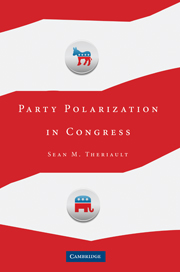Book contents
- Frontmatter
- Contents
- Acknowledgments
- 1 Party Polarization in the U.S. Congress
- PART I BUILDING BLOCKS FOR EXPLAINING PARTY POLARIZATION
- PART II CONSTITUENCY CHANGE
- 4 Redistricting
- 5 The Political and Geographic Sorting of Constituents
- 6 Extremism of Party Activists
- PART III INSTITUTIONAL CHANGE
- Bibliography
- Index
6 - Extremism of Party Activists
Published online by Cambridge University Press: 05 September 2012
- Frontmatter
- Contents
- Acknowledgments
- 1 Party Polarization in the U.S. Congress
- PART I BUILDING BLOCKS FOR EXPLAINING PARTY POLARIZATION
- PART II CONSTITUENCY CHANGE
- 4 Redistricting
- 5 The Political and Geographic Sorting of Constituents
- 6 Extremism of Party Activists
- PART III INSTITUTIONAL CHANGE
- Bibliography
- Index
Summary
In the 104th Congress (1995–6), the Oregon delegation was, perhaps, the most powerful state delegation in the Senate. Senator Mark Hatfield, who was first elected in 1966, chaired the Appropriations Committee. His colleague, Senator Bob Packwood, who entered the Senate two years after Hatfield, chaired the Finance Committee. Although Oregon had voted for Democratic presidential candidates in every election between 1988 and 2004, Democrats could not defeat these long-serving moderate Republicans, though both senators faced increasingly spirited contests.
Although their presentations of self were very different, Hatfield and Packwood walked a very similar electoral strategy. They frequently had to defeat more conservative Republicans in their party primaries and then appeal to enough moderates in Portland so that the Democratic candidates could not use a huge Portland surplus to override the Republican majority throughout the rural parts of the state. Through their moderate ideologies (Hatfield's DW-NOMINATE score was −0.02 and Packwood's was 0.03) and the powers of incumbency, they both survived. In the 104th Congress, however, both long-serving senators saw the proverbial handwriting on the wall.
Packwood's years of womanizing and ethical transgressions caught up with him in 1995, when he resigned rather than face certain expulsion. Hatfield, on the other hand, found his brand of moderate politics built on a long-standing opposition to military intervention increasingly difficult to practice in a Republican party dominated by Newt Gingrich and his conservative foot soldiers.
- Type
- Chapter
- Information
- Party Polarization in Congress , pp. 109 - 128Publisher: Cambridge University PressPrint publication year: 2008



